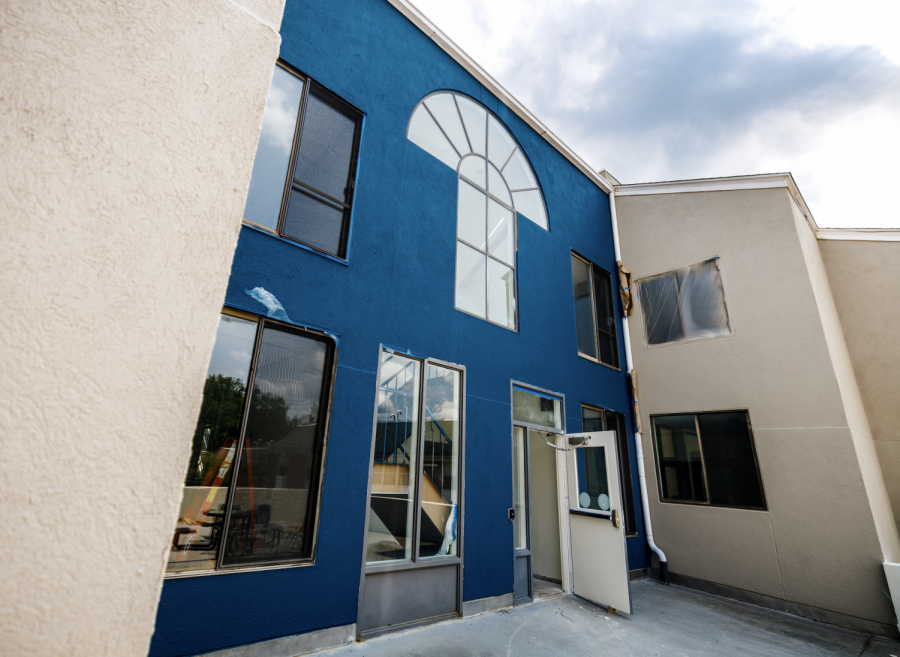Quinnipiac’s transformation continues with The Complex renovation
August 21, 2021
The Complex is move-in ready with a new spacious, modern feel for students after an entire summer of reconstruction since mid-May as a part of Quinnipiac University’s 10 year master plan.
The six-person apartments in The Complex, which includes Bakke, Sahlin and Founders residence halls, are now de-densified into four-person apartments. Each dorm contains a double and two single-person bedrooms, making a total of 60 single rooms. The number of beds reduced from 180 beds to 120 beds, creating a more comfortable space for students. The reconstruction also provides new kitchens with islands, energy-efficient lighting throughout the apartments, renovated bathrooms, new floors, indoor and outdoor paintwork and new bedroom and common room furniture.
The university worked with student representatives, residential life representatives, architects and engineering companies to make the vision of a modernized space come to life.
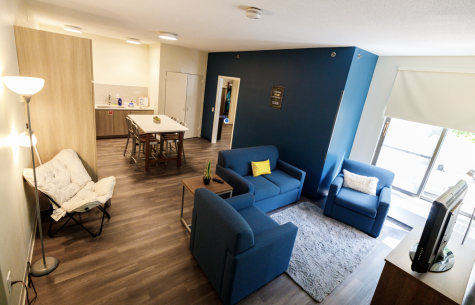
“I think it [the reconstruction] really dresses up the space and makes it a much more comfortable and modern type of arrangement than The Complex was previously,” said Mark Devilbiss, the director of residential life. “I think it’s leaps and bounds an improvement for the campus community and I have heard from a lot of students who are excited to be living there in the Fall.”
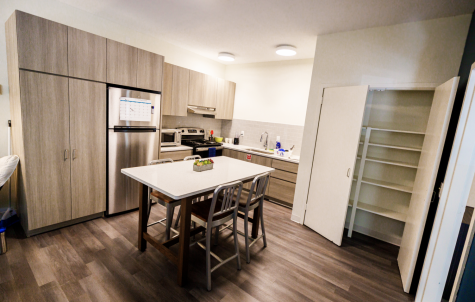
Amanda Undari, a sophomore journalism major, will be living in Sahlin with her roommate this upcoming semester. After exploring their options, they found Sahlin and are grateful to be living in a new and improved compound.
“I’m definitely excited about it,” Undari said. “I’m really lucky to have picked the right place that they’re renovating and I get to live there the first time it’s renovated, so I definitely have more positive feelings about it.”
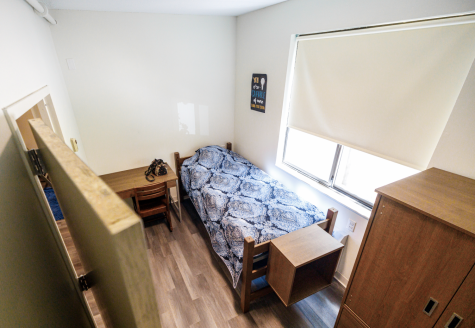
According to Chief Financial Officer Mark Varholak, the funding of the renovation comes from the university’s operating budget, reserved for capital improvements and building projects, which is funded approximately $10 million each year. Tuition costs will not be affected by the renovation of the Complex or any other building projects associated with the master plan.
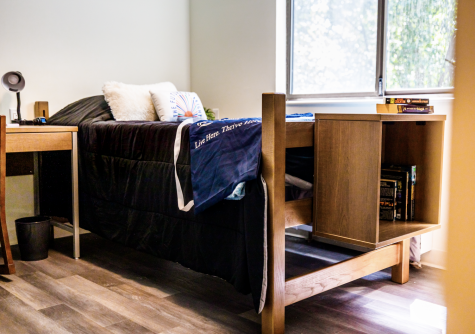
Jordan Soboloski, a sophomore occupational therapy major, will be living in Founders this year and is excited for the modernized rooms and updates the master plan will provide to campus life. However, she is concerned about walking to classes with fences and equipment possibly in the way due to other constructions happening on campus.
“I think that it will be nice to have new updated buildings, but I also think that since they are doing a lot of reconstruction, I think that it will be a little bit of an inconvenience to constantly have construction on campus,” Soboloski said.
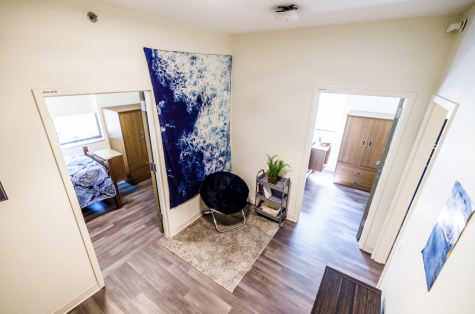
The Vice President for Facilities and Capital Planning Salvatore Filardi says students should not be worried about the reconstructions on campus. According to Filardi, any major constructions are isolated and fenced to keep it secure while students are on campus. Signage is also provided to redirect students when walking on campus.
“I would remind students the construction benefits them and if we’re going to turn over a building in two years and you’re done in one year and you don’t think it benefits you, then you have to look at the bigger picture,” Filardi said. “It benefits the university and any benefit to the university becomes a benefit to you because you’re a lifelong bobcat.”
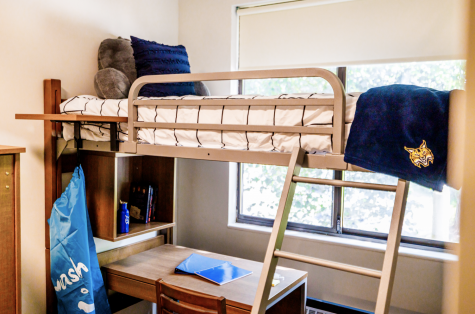
Madison Jessen, a junior biomedical science major, was quarantined in Bakke for two weeks due to tonsillitis. According to Jessen, she noticed the dorm had a lot of space, but very little storage with outdated furniture. When first walking into the common room, she saw there was only a table with two chairs, even though her apartment had six beds total. With her own bed, she struggled to sit on it due to little headroom.
“I think it would definitely be a lot easier for students to function if they had a better setup in the room because it would just help them concentrate on their schoolwork better rather than focusing on how to live in such an awkwardly structured space,” Jessen said. “It’s such a nice space with lots of potential, but it just wasn’t used the right way, so a lot of people had trouble having space for anything, like work or hanging out, so just getting a better use of the space would really make a big difference.”
According to Filardi, the university was aware of students’ discomfort in the space, which is why the university built more singles, upgraded kitchens with dining rooms, swing doors that require QCard swipes instead of pocket doors requiring separate keys, portable furniture and an improved bathroom.
“The number one goal was to create housing that students want right,” Filardi said. “Our understanding was that The Complex wasn’t always appreciated. I think students felt that it was crowded because there was fixed furniture in the bedroom that you couldn’t move around, change around or make your own unique place, so that was our big thing we wanted to address, along with the density.”
Filardi added the furniture that is no longer used in The Complex will either be sold, donated or thrown out depending on the furniture’s condition. The university will recycle good furniture for others or the university.
Devilbiss says the university responded to the need for more singles at the request of students.
“It was important to us to be able to offer more single bedrooms on the Mount Carmel campus and this provides that opportunity,” Devilbiss said. “We have noticed more, over time, there is a lot of desire and single bedrooms are popular among students and because we had the capacity to offer that we definitely wanted to do so as a result of feedback from students.”
Undari is glad to have more space in her new apartment. However, she is concerned the change from a six-person suite to a four-person suite may affect friend groups of six who want to live together.
“I feel like now that COVID keeps cycling through and if it happens in the future I think it’s better to have less people because it would make it less likely to spread the infection, so from that stance I think it’s good, but from the sense of people who want to move in as a group of six it kind of sucks,” Undari said. “I guess, there are a lot of other residence halls with six-person suites that you can choose from, so I don’t think it’s the worst thing in the world, but it definitely might not be the best thing for some people.”
The Complex is handicapped accessible and has ventilation along with a hot water system and radiators in all the bedrooms. However, there is currently no air conditioning.
“For any major renovation to residence halls or construction for new residence halls, I think it’s safe to assume we would put in air conditioning,” Filardi said. “In this particular case, this really was a short-term, relatively inexpensive renovation to get the beds up to a better satisfactory level and we weren’t looking to gut renovate the whole thing. The master plan actually said in the long-term we probably would want to tear those buildings down and so in the short-term, it makes sense to keep the beds and spruce them up versus tear them [the buildings] down, so there’s no AC in the building.”
Although The Complex has energy-efficient lighting, Filardi said for now the university will not add major renovations to the building, such as changing from fossil fuel to solar power or energy-efficient appliances. The primary focus of The Complex renovation was to add more comfortable bedding and a modern, spacious layout.
During the renovation process, construction companies struggled to find supplies during COVID-19, which according to Filardi was a “nightmare.”
“That situation affected everything we’re doing, everywhere,” Filardi said. “It happened in The Complex on refrigerators, hood exhaust and light adjustments, so we just made those adjustments as we went where we just changed the items we had specified and used something else.”
Despite the challenges, the university managed to collect the necessary supplies and The Complex will be move-in ready for students.
“I think students are going to love the space,” Filardi said. “It’s clean and new, so I think they’ll be excited about it.’
Moving forward in the university’s master plan, more residence halls, including Commons, Crescent, Eastview and Westview, will be renovated next summer.


